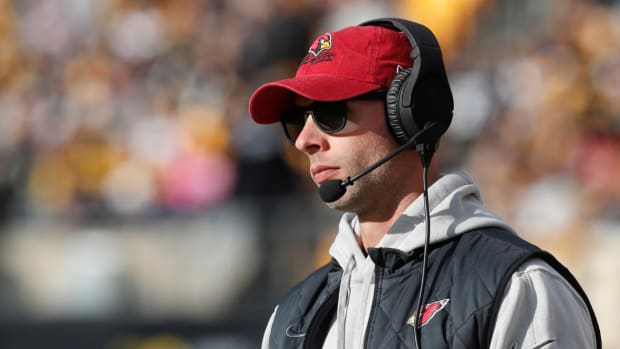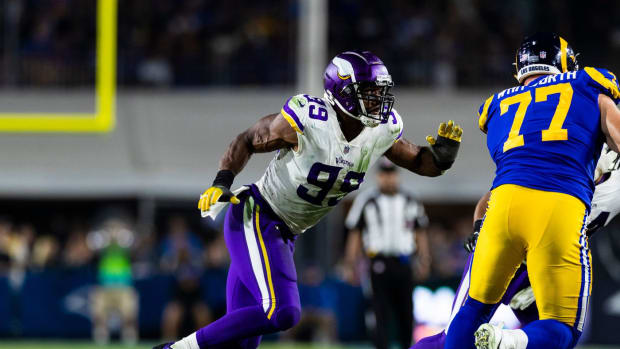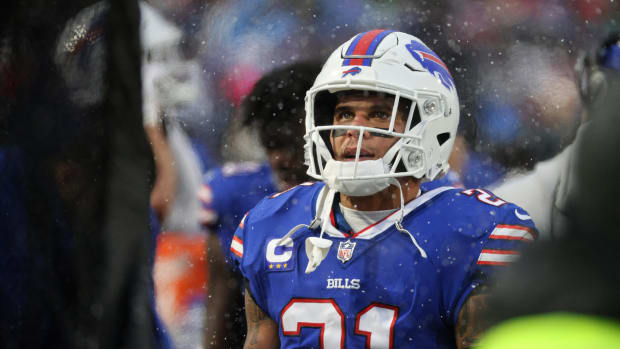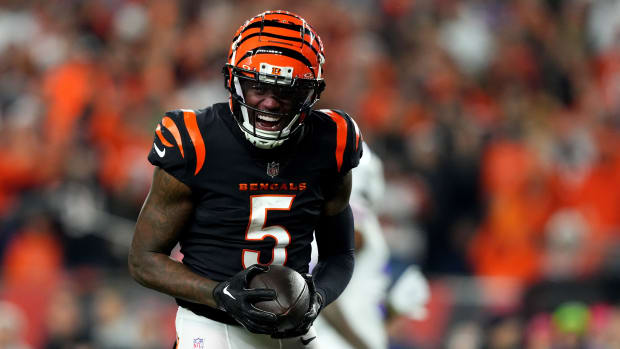Why the Giants Should Pass on the QBs at No. 2
Popular belief is the Giants will draft a quarterback at No. 2 and develop him behind Eli Manning for a year or two. But recent history says it wouldn’t go that way. In the last 12 years, exactly zero first-round quarterbacks have sat as rookies and gone on to become a franchise guy.
The last first-rounder to do it was Aaron Rodgers, who fell into Green Bay’s lap in 2005. Plenty of teams since have drafted guys with the plan to groom them from the bench, but that’s not how it plays out. Either the team impatiently rushes the rookie onto the field, or the rookie toils from the bench and busts. Maybe Patrick Mahomes will break the trend in Kansas City; we won’t know for a few years.
This isn’t to say the Giants shouldn’t take a QB at No. 2 if there’s one they absolutely love. But the notion that doing so would be the responsible long-term approach is false. In fact, drafting a developmental QB would be about the riskiest thing they could do. It’d be much safer to draft with a “win now” perspective.
The Giants are in more of a “win now” territory than perhaps any team that’s ever earned a No. 2 pick. Two years ago, they went 11-5 and made the playoffs. Last season they fell apart when the entire receiving corps got hurt and their once-dominant defense started blowing coverages. Overall roster talent was not the issue.
New general manager Dave Gettleman, like predecessor Jerry Reese, believes in building through your defensive line. (In 2016 with Carolina, Gettleman even used his first-round pick on defensive tackle Vernon Butler, despite having 2013 first-and second-round stud defensive tackles Star Lotulelei and Kawann Short.) Gettleman believes you can never have too many D-linemen—and after trading Jason Pierre-Paul to Tampa Bay, his Giants currently don’t even have enough.
Exacerbating the Giants’ 2017 coverage woes was their anemic four-man rush. Pierre-Paul was part of that. He’s a superb run defender but only a good-not-great pass rusher. The same is true of the D-line’s remaining stars, Olivier Vernon, Damon Harrison and rising second-year man Dalvin Tomlinson. N.C. State defensive end Bradley Chubb could be a crucial missing piece for the Giants. New defensive coordinator James Bettcher, a believer in aggressive and complex blitzing, is a little less dependent on a four-man rush than predecessor Steve Spagnuolo was, but Bettcher also learned in Arizona—where he had Chandler Jones—the value of having a dominant edge presence.
Besides needing help defensively, there’s also the matter of New York’s quarterback still being viable. If you just watched Manning on film, you wouldn’t know if he was 31 or 36 years old last year. His arm, like it has always been, is strong enough. His numbers were poor in ’17 and, by some metrics, just so-so in ’16, but many times in his career Manning has been better than his stats suggest. As a quarterback who controls games at the line of scrimmage and plays (most of the time) on schedule, he’s right for new head coach Pat Shurmur’s system.
The argument for the Giants taking a quarterback is that they likely won’t be at the top of the draft again any time soon, that this is their opportunity to strike. And maybe there’s something to that. But Gettleman could reason that they won’t soon be just a piece or two away from NFC East contention again, either. And, not to imply that Gettleman wouldn’t do what’s best for the franchise—be it build for the short-term or long-term—but at 67 years old and having won an NFC championship with the Panthers just three years ago, what’s likelier: that he arrived to help the Giants lay a new foundation, or that he’s here to push them over the top?
THE QB PROSPECTS
This year’s quarterback class is fascinating because, except for Josh Rosen, all the potential first-rounders feature mobility as a crucial part of their games. What NFL teams must figure out is: Just how crucial? A QB can run his way to success in college. In the NFL, however, his mobility cannot be his house’s biggest load-bearing wall (so to speak). A pro QB still must be able to play on schedule within the pocket. Identifying which mobile ones can and can’t is difficult.
• RAMS ADD SUH, BUT QUESTIONS REMAIN: Andy Benoit breaks down the new-look Rams D.
TWEET ELABORATION
Yes, I’m coming back to this tweet again because a high-ranking member of the Jets, whom I really respect, approached me at Josh Allen’s pro day with a “bone to pick.”
NYJ Guy: Just because we went after Kirk doesn’t mean we don’t like these rookie quarterbacks.
Me:Love, do you love these rookie QBs?
NYJ: Yes, love.
Me: But then why would you pay $90 million over three years for Kirk if you can get one of the quarterbacks you love on a rookie deal for around $20 million over four years?
NYJ: Have you seen our cap situation?
Me: So you’re saying money is less of an object than usual?
NYJ: Correct.
We could have a philosophical discussion about whether it’s wise to spend big money just because you have it—there are arguments for both sides. You could also argue that for New York’s trade with Indy to make sense, there’d have to be three quarterbacks they love, since they’ve only moved up to third in the draft. How often does a team fall in love with three different quarterbacks the same year?
But—and here’s the main reason I wanted to revisit this tweet—thinking later about the conversation with the Jets guy, I realized I overlooked something: The rookie quarterbacks don’t just cost the Jets $20 million over four years, they cost the Jets $20 million over four years plus three second-round draft picks, since that’s what New York gave up to climb from No. 6 to No. 3. The Jets guy alluded to this, saying, “If we’d signed Kirk, we’d then use our picks to build around him.”
It still feels like the Jets are making a mad scramble for a QB. Some might call that reaching—particularly if you believe ownership is provoking it. But as another person at the Josh Allen pro day said to me, “Can you blame them? In the NFL, you gotta do whatever you can to find that QB.”
NON-FOOTBALL THING ON MY MIND
The best part of going on a double-date is talking about the other couple afterwards on the drive home.
• Question or comment? Email us at talkback@themmqb.com.





































